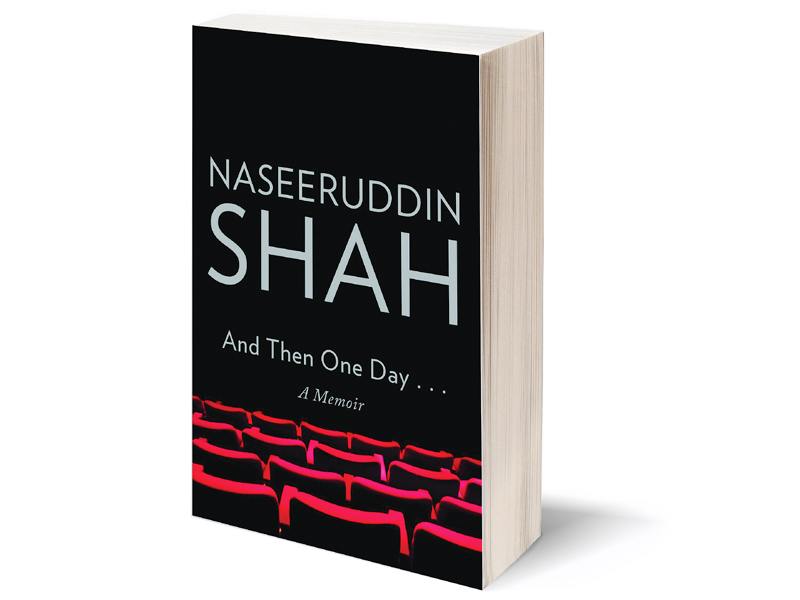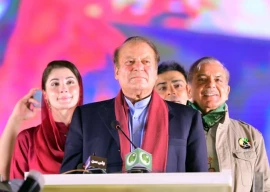
On the receiving end of his sincere pick-me-up were the novice cast and crew of the film. And Mr Naseeruddin Shah. While it must have infuriated other ‘stars’ of Shah’s standing and calibre, it is reported that he was the one who laughed the loudest, thoroughly enjoying the lack of recognition that had made the Austrian visitor so truthfully frank. Although not mentioned anywhere in his masterfully self-penned memoir And Then One Day, this little gem serves as the perfect introduction to a man whose maddening passion for acting was ignited as a child by pretty much the same thought — it’s good to pretend to be someone else.
Naseeruddin Shah, or the “honourary Parsi Nazru Dinshaw”, as his wife Ratna Pathak’s extended family once branded him, is anything but anonymous to the three generations of fans he has spawned across the globe. In his brutally honest and sometimes salacious memoir, he shares many a laughs and some sorrows with his readers, stringing together the madness of devotion to the craft of film and theatre that has sustained him throughout life. Irreverent, boldly opinionated, somewhat condescending and at some points bordering on misanthropic, Shah’s memoir is a searing read. It chronicles with a passion the perils of a life shaped by the fading colonial mannerisms so many families found themselves clinging to at the time of Partition and the early belief that he was an “absolute idiot” and an “ugly” one at that.

Author Naseeruddin Shah
Ordaining himself a spectacular failure at academics, Shah writes candidly of the constant disappointment he was to his authoritative (and authoritarian) father and a minor nuisance to his mother. Avoiding the clichéd practice of discussing a partly imagined familial linkage with some historical figure or the auspicious instance of his own birth as is the norm in many autobiographies, Shah instead recalls the finer details of the life and style of his handsome uncles and capable cousins, all the while giving the reader a taste of what he felt like as an unnecessary hook-nosed and mop-topped whippersnapper whose own father had fervently wished him to be a girl while he was still in his mother’s womb. Taking us through the Blytonesque recollection of his school days where a blessing in disguise was the weekly film screenings, and a less than comforting stint at Aligarh Muslim University, which ended in much academic heartbreak, Shah swiftly brings us to the point where, after “slumming it” he finally started getting his big breaks in theatre, and then in films.
A career spanning close to 40 years has yielded some of the most memorable performances by Shah that may not be the general masala films Bollywood is so famous for, but are from the stable stock of alternative cinema that has always existed in India with gusto. To those who are unaware of his earlier fare with greats like Shyam Benegal, there are still staples that they can fall back on when discussing him. One may be his infuriating turn as the cheating husband who brings the living breathing proof of his infidelity, an illegitimate son, to his devoted wife in Shekhar Kapoor’s Masoom. The other is his morbidly astute portrayal of the great poet Ghalib in the eponymous drama series, directed by Gulzar. The image of the legend played so masterfully by Shah, ensconced in winter mist, cane in hand and the fragility of age in gait, with Jagjit Singh’s baleful rendition of one of Ghalib’s most famous ghazals still has the capacity to sear itself into the heart and mind of any viewer.
The book, at 316 pages, does not record Shah’s thoughts on Zinda Bhaag or Khuda Kay Liye. There is no mention of his more mainstream roles in new films such as The Dirty Picture, Dedh Ishqiya, Peepli Live, Maqbool, or the embarrassingly terrible League of Extraordinary Gentlemen but provides plenty of insight into the mind of a committed adherent to the art of cinema who has steadfastly held onto the belief that mainstream Bollywood is basically “Follywood” and that award shows are a bunch of people patting their own backs. And while throughout the text he maintains a certain sort of high-nosed lack of interest in partaking in the rat-race many actors indulge in to secure roles, he does admit to throwing his all into lobbying to get the title role in Richard Attenborough’s Gandhi.
“(When) I was 14, I wanted to play Zorro not Gandhi; but now closing in on 30, I thought the prospect was worth pursuing,” writes Shah on the matter. It is revealed a few paragraphs later how the machinations of the film crew ensured his screen test in rainy London was basically a farce to appease the Indian press and give them the illusion that a “native” would be cast to play the Mahatma. Ben Kingsley got the part, and got the Oscar for the part, and Shah, in his own words, found it terribly ironical that the one role he really truly went after eluded him.
Peppered with anecdotes about certain contemporaries, the memoir veers away from making caricatures of actors such as Amitabh Bachchan, Dharmendra, Amol Palekar and more. However, the one other actor Shah reserves his quiet admiration for is the formidable Om Puri, who was a fellow theatre student with him and was even responsible for saving Shah’s life at one jarring point. In between the “professional” narrative, we also learn how Shah married a much older Pakistani lady at 19 to legitimise her stay in India and then further complicated things by fathering a daughter with her, whom he didn’t understand or reconcile with till she turned 12. A substantial part of the book in the last half is also dedicated to “the love of his life”, his wife Ratna Pathak. His many romances and dalliances, and anecdotes of substance abuse unmask him as a human, a hot-blooded one at that, especially for this generation which has only ever seen him with the salt and pepper hair and time carved onto his face in the form of wrinkles.
The memoir is worth reading for any fan, filmmaker, theatre producer or acting student. Neither preachy nor academic, the unflinching look back at the life of one of the greatest actors alive today is a treat not to be missed. For many, a Naseeruddin Shah play, film or dramatic reading feels like a ploy to bring all these generations closer together. While the young Shah would scoff at the very idea, the older Shah we have inherited from our parents would possibly fully endorse it.
Nuzhat Saadia Siddiqi is a Lahore-based writer and book hoarder. She tweets @guldaar
Published in The Express Tribune, Sunday Magazine, November 9th, 2014.

























1714024018-0/ModiLara-(1)1714024018-0-270x192.webp)









COMMENTS
Comments are moderated and generally will be posted if they are on-topic and not abusive.
For more information, please see our Comments FAQ